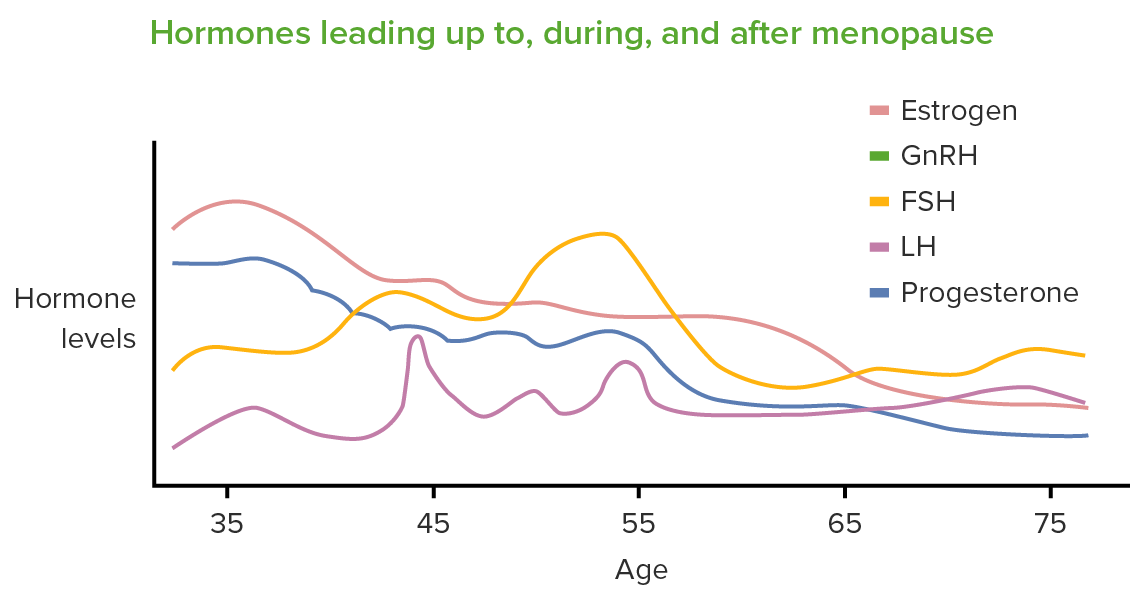Playlist
Show Playlist
Hide Playlist
Hormone Replacement Therapy
-
Slides MenopauseManagement Menopause.pdf
-
Download Lecture Overview
00:01 Now let's review hormone replacement therapy. 00:03 As you may have heard, hormone replacement therapy has been fraught with lots of medical controversy in our community. 00:10 There was a study that came out that cited some unpleasant side effects associated with estrogen therapy, and therefore the appropriate patient should be selected to actually give hormone replacement therapy, but let's review what the types of therapy are. There's estrogen alone therapy. 00:28 This is reserved for a patient who does not have a uterus and therefore there is no risk of endometrial cancer or hyperplasia. 00:36 And in a woman who has a uterus, combine estrogen progestin therapy will be normally given together. 00:43 The progestin protecting the uterus from any endometrial hyperplasia or endometrial cancer. And additionally there's even more controversy about testosterone therapy. Estrogen or estrogen progestin therapy is currently indicated for the treatment of common symptoms such as hot flushes and vaginal atrophy. 01:03 Testosterone preparations are indicated for the treatment of hypoactive sexual desire disorder. 01:08 Let's now review the risks of hormone replacement therapy, specifically estrogen or estrogen progestin. 01:16 Based on the WHI, we know that there are increased risks of cancer including breast, endometrial, as well as increased risk of cardiovascular risk, and thromboembolic events. There are contraindications under which the patients should not be given hormone replacement, undiagnosed abnormal genital bleeding, known or suspected estrogen-dependent neoplasia such as breast cancer that's ER positive, active or history of DVT or pulmonary embolism, active history or MI, or current medical status of MI or stroke, liver dysfunction, and of course pregnancy. 01:57 Let's now review hormone replacement for the management of vasomotor symptoms. 02:02 Traditionally, hormone replacement was given as an oral estrogen. 02:07 However, we know that transdermal estrogens have less side effects and a lower risk profile. Also, transdermal estrogens give a steady state and decrease the risk of hot flashes. 02:19 However, if you forget to take your oral estrogen, you may experience hot flashes due to the drop in the level of estrogen. 02:25 We also know that the transdermal estrogen eliminates the first patch effect and therefore, they have less coagulopathies or VTE, or PE, or DBT. 02:38 Let's now review some common treatment modalities for vasomotor symptoms. 02:43 As I stated before, transdermal patches have an advantage and they go directly into the bloodstream, and maintain estradiol levels. 02:51 If the patient does not have a uterus, then she can use an estradiol patch alone without a progestin. However, if she has a uterus then she'll need to use a combi-patch or some type of oral progestin so that she has a withdrawal bleed. 03:05 However, she can also use a levonorgestrel IUD which secretes progestin and these progestins protect the uterus from hyperplasia or endometrial cancer. 03:15 You can use other forms of estrogen besides transdermals or oral estrogens. 03:22 You can use topical estrogens. That is to say that they are not patches but they are emulsions, creams, sprays, and gels, that can be placed on the skin and immediately absorb into the blood stream. 03:34 So you have again, estrogen creams or emulsions, topical sprays, or estrogen gels. 03:40 And if the patient is suffering from vulvovaginal atrophy, then you should try to treat locally with either, Vagifem which is actually a vaginal estradiol tablet, vaginal cream which is an Estrace cream that can be placed outside of the vagina on the vulva, and the intravaginal ring, the Estring. 04:04 All of these are great modalities to treat atrophy. 04:07 Because these are lower doses that are locally administered, you don't need to give these patients progestin as long as they're not taking some other type of oral or transdermal medication. 04:17 Let's now review again that all forms have equivalent efficacy for hot flush treatment but they have different safety profiles. 04:24 Let's now review some commonly used herbal supplements. 04:29 I do not advise that you recommend to your patients that they use these. 04:33 These are not FDA approved and can have side effects and interactions with different medications. First let's discuss black cohosh. 04:41 This is a traditional medicine that comes from a buttercup family plant. 04:46 It's been used in Chinese and Native American medicine to treat hot flashes or hot flushes, but it's been known to cause hepatitis or liver toxicity, and can pathologically lower your blood pressure. 04:56 Soy or phytoestrogens have also been used but recall that any type of estrogen can still interact with the estrogen receptors and cause the same side effects that you see with synthetically made estrogens. 05:09 We also have flaxseed that's commonly used by patients. 05:12 It can lower cholesterol which is a good thing but it's also a phytoestrogen and can cause potentially the same effects as regular estrogen. 05:21 Let's now review again vaginal atrophy in the context of herbal supplements. 05:28 There have been various herbal supplements that have been used for the treatment of menopausal symptoms but they have not been shown to be as effective as HRT in placebo-controlled studies and there are definitely concerns about safety so be careful and tell your patients that they should stop these medications if they would like to actually initiate treatment. 05:46 Thank you for listening and good luck on your exam.
About the Lecture
The lecture Hormone Replacement Therapy by Lynae Brayboy, MD is from the course Menopause.
Included Quiz Questions
Which of the following is an indication for estrogen therapy or estrogen and progesterone hormone replacement therapy?
- Hot flashes
- Endometrial hyperplasia
- Increasing bone density
- Birth control
- Hypoactive sexual desire disorder
Which estrogen-dependent cancer has an increased risk of developing during hormone replacement therapy?
- Breast cancer
- Ovarian cancer
- Cervical cancer
- Thyroid cancer
- CNS cancers
Which of the following is NOT a contraindication for the use of estrogen hormone replacement therapy?
- Patient having osteoporosis
- History of endometrial cancer
- History of deep vein thrombosis or pulmonary embolus
- Patient with liver dysfunction
- Patient with abnormal genital bleeding
Which of the following is FALSE regarding estrogen and estrogen-progesterone hormone replacement therapy?
- Different methods of estrogen administration have the same safety profile but different efficacy for the treatment of hot flashes.
- Black cohosh, soybeans, and flaxseed are examples of plant-derived estrogens.
- Transdermal patches provide a constant source of estrogen.
- Transdermal patches escape the first-pass mechanism and decrease the risk of deep vein thrombosis.
- Estrogen creams, gels and intravaginal rings are used for the treatment of vaginal atrophy.
Customer reviews
4,5 of 5 stars
| 5 Stars |
|
1 |
| 4 Stars |
|
1 |
| 3 Stars |
|
0 |
| 2 Stars |
|
0 |
| 1 Star |
|
0 |
Thanks! I needed to be updated in this area and you made a great job. /MD in Sweden
I’m just getting an over view at the moment however, Dr Lynae Brayboy’s lectures are lovely, clear and informative thank you! Interesting that alternative treatments are also mentioned though made clear not FDA approved. But that is expected from the FDA as they tend only to be concerned with synthetic drugs and not herbal treatments. While most herbal treatments have been used throughout history and are said to have little or no side effects can still be dangerous (contraindicated) if taken with or along side prescribed medications. I believe this comes across pretty clearly in these lectures, that strive to be unbiased. But as stated Hormone Replacement Therapy (HRT) is a controversial treatment.




